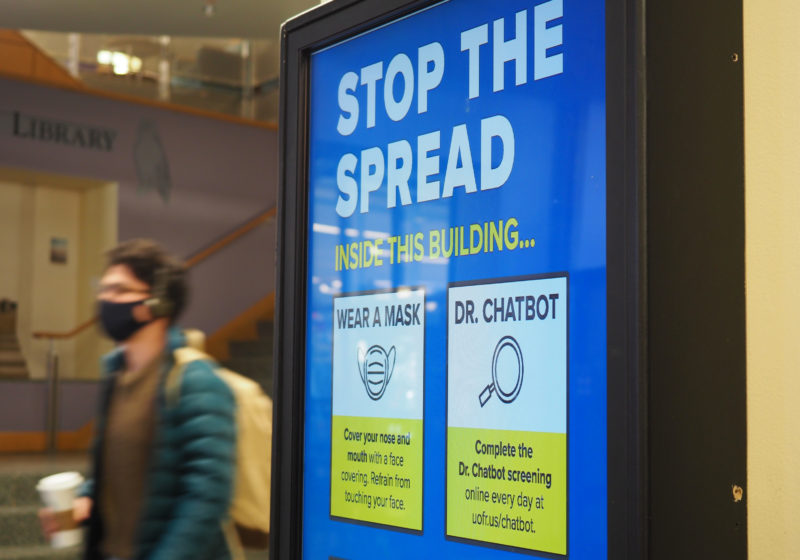The end of the pandemic era of our college careers is finally approaching, so to celebrate, I’d like to reflect on and critique the various public health measures implemented throughout the year. Some of these may feel minor or nitpicky, but the fact remains: They’re just bad policy.
Wristbands
Remember these? Wristbands were absolutely 100% required to be worn at all times from January move-in through the first week of the semester, even when you were sleeping. Obviously everyone definitely wore them. Clearly, the school felt that giving people friendship bracelets would satiate their craving for frat parties. But what did it actually accomplish? Nothing. Nobody checked it, and even if they did, it simply showed whether the person had a single rapid negative COVID-19 test upon return to campus, not whether they were at that moment COVID-free.
Messaging about Compliance
One of the things that’s irked me most, especially before the guest policy changed, was administration’s focus on compliance rather than mitigating risk. For example, in early February, UHS Director Ralph Manchester, Dean of the College Jeffrey Runner, and President Sarah Mangelsdorf each sent separate emails expressing concern over a surge in cases. While they acknowledged the difficulties of pandemic living, they all fell back on some sort of “adhere to guidelines” or “follow the rules” messaging. Of course, back then you weren’t allowed to have any guests over. But someone who only ever interacted with their significant other, with whom they broke the guest policy, was much less of a risk than someone who followed all the rules but got lunch with a different three friends every day. Instead, messaging should’ve focused on limiting the amount of exposures you have as opposed to simply following the rules.
Dr. Chatbot
Overrated. As long as you fill it out when you do have symptoms, you should be fine, in my opinion. I don’t see much benefit that comes from filling it out when you don’t have symptoms, as long as you fill it out truthfully when you do. It would’ve been pretty simple to change the messaging from “fill out Dr. Chatbot every day” to “report your symptoms.” But the University didn’t. Why? God knows.
Messaging About Vaccines
One of the more upsetting things this semester has been the lack of privileges awarded to students who get vaccinated. An announcement at the end of February said that fully vaccinated students needed to continue fully adhering to the same guidelines as unvaccinated students.
Focusing entirely on the policies they still have to follow instead of what can change for them doesn’t serve to encourage people to get the vaccine. Additionally, as the social fabric of campus and mental health of the student body has been quite bad this year, the University missed an opportunity to let vaccinated students safely socialize more often, albeit within the rules. By not doing so, they showed that they value the continued compliance of vaccinated students over the campus-wide benefits of increased social interaction. There was one policy change for vaccinated students that was buried at the bottom of the announcement and not mentioned at all in the @Rochester summary: Vaccinated students wouldn’t need to quarantine if exposed to someone who tested positive.
Contact Tracing
According to an email correspondence I had with Ralph Manchester for previous Campus Times articles, contact tracers are only able to identify the source of spread half the time. This is concerning, because it gives us a flawed understanding of what activities are safe. Some of the blame could probably be put on students who don’t tell contact tracers that they were partying, but the public health regime deserves some of the blame, too. More specifically, contact tracing asks a person who tests positive who they’ve been exposed to. But the definition of exposure used by contact tracers requires that both people are within six feet of each other without a mask on for at least 15 minutes. Interactions in which everyone is masked don’t count as exposure. So if the virus spreads in places where nobody is exposed according to that precise definition, such as classrooms, we wouldn’t ever know.
Dining Hall Entrance/Exit Designation
I place the blame for this one solely on the New York State government, but it really grinds my gears. If I’m eating at the tables in Douglass behind the Kosher station, I’d want to leave from the doors near check-in. But the state requires that there be separate entrances and exits, so I need to walk all the way around, in the process potentially exposing me to more people than I would have been otherwise. Additionally, a remote semester means dining halls are so empty that the anticipated traffic jams of past semester aren’t even likely to occur. If there’s any silver lining, it’s that maybe in a post-pandemic world, the exit doors will actually function as doors.




